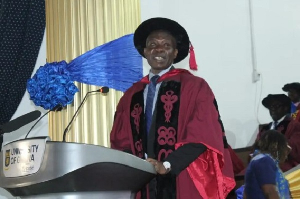Professor Mark Mawutor Tettey, the Head of the Department of Surgery at the University of Ghana Medical School (UG), has stated that most throat injuries in children occur in homes where soap is made.
He explained that these children accidentally consume caustic soda, a key component in soap making, leading to caustic injuries that "damage structures in the oral cavity, pharynx, and oesophagus."
Professor Tettey shared these insights while delivering an inaugural lecture at the Great Hall of the University of Ghana on the topic, "The Scourge of Caustic Burns to the Throat: Challenges of Restoring a Normal Swallowing Mechanism."
He highlighted the dangers of improperly stored caustic substances in homes, which can lead to accidental ingestion by children who mistake them for water due to caustic soda being tasteless, odourless, and colourless. Such incidents can result in caustic injuries requiring urgent medical surgery.
Professor Tettey noted that patients who survive the initial treatment of caustic ingestion often face long-term complications and severe damage to their upper digestive tract.
He reported that approximately 80 per cent of caustic injuries in Ghana are confined to the oesophagus, with children making up 90 per cent of the patients.
Caustic injuries to the aerodigestive tract can occur when individuals accidentally or intentionally ingest strong acids or alkalis.
Caustic soda, being a potent alkali, causes severe tissue damage upon contact.
The chemical reactions from such contact can lead to chemical burns and necrosis, potentially penetrating deep into tissues and organs.
Professor Tettey mentioned that the Ghana Cardiothoracic Centre has been motivated to develop a procedure that would eliminate the need for tracheostomies in patients.
This pursuit led to the creation of a procedure known as Colon-Flap Augmentation Pharyngoesophagoplasty, which has already benefited over 20 patients with excellent outcomes.
He urged stakeholders to diligently work to prevent the accidental ingestion of caustic soda among the vulnerable and called on the government to establish policies and regulations to control the import, packaging, and sale of this hazardous substance, as well as to educate end-users, particularly mothers with limited literacy.
Professor Nana Aba Appiah Amfo, the Vice-Chancellor of the University, praised the medical breakthrough by the National Cardiothoracic Centre as a testament to effective leadership, teamwork, and mentorship.
She advocated for stringent regulation and education regarding safe soap-making practices at home.
Health News of Sunday, 19 May 2024
Source: GNA
Most throat injuries in children occur in homes where soap is made - Prof. Tettey
Entertainment












